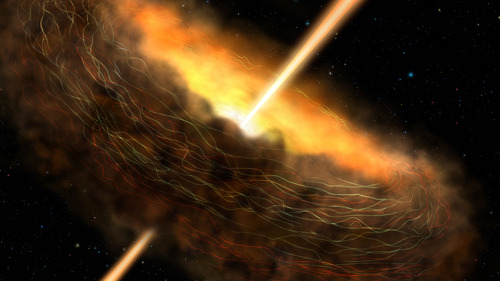Monstrous-mind - The Monster Mind

More Posts from Monstrous-mind and Others
🔭🌃🌌
orionids meteor shower
🍂🍁🍂🎃🌎









Beautiful ginkgo trees at historic Sungkyunkwan University.
🛫🔭🌌
10 Amazing Space Discoveries by the World’s Largest Flying Observatory

On the night of May 26, 2010, the Stratospheric Observatory for Infrared Astronomy, or SOFIA, the world’s largest flying observatory, first peered into the cosmos. Its mission: to study celestial objects and astronomical phenomena with infrared light. Many objects in space emit almost all their energy at infrared wavelengths. Often, they are invisible when observed in ordinary, visible light. Over the last decade, the aircraft’s 106-inch telescope has been used to study black holes, planets, galaxies, star-forming nebulas and more! The observations have led to major breakthroughs in astronomy, revolutionizing our understanding of the solar system and beyond. To celebrate its 10 years of exploration, here’s a look at the top 10 discoveries made by our telescope on a plane:
The Universe’s First Type of Molecule

Scientists believe that around 100,000 years after the big bang, helium and hydrogen combined to make a molecule called helium hydride. Its recent discovery confirms a key part of our basic understanding of the early universe.
A New View of the Milky Way

More than a pretty picture, this panorama of cosmic scale reveals details that can help explain how massive stars are born and what’s feeding our Milky Way galaxy’s supermassive black hole.
When Planets Collide

A double-star system that is more than 300 light-years away likely had an extreme collision between two of its rocky planets. A similar event in our own solar system may have formed our Moon.
How A Black Hole Feasts

Fear not, the dark, my friend. And let the feast begin! Magnetic fields in the Cygnus A galaxy are trapping material where it is close enough to be devoured by a hungry black hole.
Somewhere Like Home

The planetary system around Epsilon Eridani, a star located about 10 light-years away, has an architecture remarkably similar to our solar system. What’s more, its central star is a younger, fainter version of our Sun.
A Quiet Place

Black holes in many galaxies are actively consuming material, but our Milky Way galaxy’s central black hole is relatively quiet. Observations show magnetic fields may be directing material around, not into, the belly of the beast.
The Great Escape

Ever wonder how material leaves a galaxy? The wind flowing from the center of the Cigar Galaxy is so strong it’s pulling a magnetic field — and the mass of 50 to 60 million Suns — with it.
Exploding Star, New Worlds

What happens when a star goes boom? It turns out that supernova explosions can produce a substantial amount of material from which planets like Earth can form.
Stellar Sibling Rivalry

They say siblings need time and space to grow, but here’s one that really needs some room. A newborn star in the Orion Nebula is clearing a bubble of space around it, preventing any new luminous family members from forming nearby.
Clues to Life’s Building Blocks

Radiation from stars is making organic molecules in nebula NGC 7023, also known as the Iris Nebula, larger and more complex. The growth of these molecules is one of the steps that could lead to the emergence of life under the right circumstances.
SOFIA is a modified Boeing 747SP aircraft that allows astronomers to study the solar system and beyond in ways that are not possible with ground-based telescopes. Find out more about the mission at www.nasa.gov/SOFIA.
Make sure to follow us on Tumblr for your regular dose of space: http://nasa.tumblr.com
🍃🍁🍂🎃🍂🍁

🐈🌌🚀



Alien Directed by Ridley Scott (1979)

The View Toward M101 : Big, beautiful spiral galaxy M101 is one of the last entries in Charles Messier’s famous catalog, but definitely not one of the least. About 170,000 light-years across, this galaxy is enormous, almost twice the size of our own Milky Way galaxy. M101 was also one of the original spiral nebulae observed by Lord Rosse’s large 19th century telescope, the Leviathan of Parsontown. M101 shares this modern telescopic field of view with spiky foreground stars within the Milky Way and a companion dwarf galaxy NGC 5474 (lower right). The colors of the Milky Way stars can also be found in the starlight from the large island universe. Its core is dominated by light from cool yellowish stars. Along its grand design spiral arms are the blue colors of hotter, young stars mixed with obscuring dust lanes and pinkish star forming regions. Also known as the Pinwheel Galaxy, M101 lies within the boundaries of the northern constellation Ursa Major, about 23 million light-years away. NGC 5474 has likely been distorted by its past gravitational interactions with the dominant M101. via NASA

You never forget your first true love...
🔭🌃🌌

Ocean on the moon Europa
Scientists' consensus is that a layer of liquid water exists beneath Europa's surface, and that heat from tidal flexing allows the subsurface ocean to remain liquid.

Europa's surface temperature averages about 110 K (−160 °C; −260 °F) at the equator and only 50 K (−220 °C; −370 °F) at the poles, keeping Europa's icy crust as hard as granite. The first hints of a subsurface ocean came from theoretical considerations of tidal heating (a consequence of Europa's slightly eccentric orbit and orbital resonance with the other Galilean moons). Galileo imaging team members argue for the existence of a subsurface ocean from analysis of Voyager and Galileo images.

The most dramatic example is "chaos terrain", a common feature on Europa's surface that some interpret as a region where the subsurface ocean has melted through the icy crust.
The thin-ice model suggests that Europa's ice shell may be only a few kilometers thick. However, most planetary scientists conclude that this model considers only those topmost layers of Europa's crust that behave elastically when affected by Jupiter's tides.

The Hubble Space Telescope acquired an image of Europa in 2012 that was interpreted to be a plume of water vapour erupting from near its south pole The image suggests the plume may be 200 km (120 mi) high, or more than 20 times the height of Mt. Everest.
Life?
So far, there is no evidence that life exists on Europa, but Europa has emerged as one of the most likely locations in the Solar System for potential habitability. Life could exist in its under-ice ocean, perhaps in an environment similar to Earth's deep-ocean hydrothermal vents. Even if Europa lacks volcanic hydrothermal activity, a 2016 NASA study found that Earth-like levels of hydrogen and oxygen could be produced through processes related to serpentinization and ice-derived oxidants, which do not directly involve volcanism.

In 2015, scientists announced that salt from a subsurface ocean may likely be coating some geological features on Europa, suggesting that the ocean is interacting with the seafloor. This may be important in determining if Europa could be habitable. The likely presence of liquid water in contact with Europa's rocky mantle has spurred calls to send a probe there.
Missions

Europa Clipper is an interplanetary mission in development by NASA comprising an orbiter. Set for a launch in October 2024, the spacecraft is being developed to study the Galilean moon Europa through a series of flybys while in orbit around Jupiter.

The Europa Lander is a proposed astrobiology mission concept by NASA to Europa, an icy moon of Jupiter. If funded and developed as a large strategic science mission, it would be launched in 2027 to complement the studies by the Europa Clipper orbiter mission and perform analyses on site. NASA's budget for fiscal year 2021 neither mandates nor allocates any funds to the mission leaving its future uncertain.
The objectives of the mission are to search for biosignatures at the subsurface ≈10 cm, to characterize the composition of non-ice near-subsurface material, and determine the proximity of liquid water and recently erupted material near the lander's location.
source
🍁🍂🎃🍂🍁🌬🍃🐈🌄

Hello September. May you the first of so many good things to come as the unofficial start to autumn 🍂
🔭🌃🌌

M44, the beehive Cluster in Cancer constellation
Credit: Alan Dyer
-
 nostalgichalloween reblogged this · 1 month ago
nostalgichalloween reblogged this · 1 month ago -
 formor-ghost liked this · 3 months ago
formor-ghost liked this · 3 months ago -
 octobermoon-saults reblogged this · 3 months ago
octobermoon-saults reblogged this · 3 months ago -
 brittbritt86 liked this · 3 months ago
brittbritt86 liked this · 3 months ago -
 fall-halloween-color-love reblogged this · 3 months ago
fall-halloween-color-love reblogged this · 3 months ago -
 be-witchin liked this · 3 months ago
be-witchin liked this · 3 months ago -
 aimlessimagination liked this · 3 months ago
aimlessimagination liked this · 3 months ago -
 uncensored-aj liked this · 3 months ago
uncensored-aj liked this · 3 months ago -
 skycloudking liked this · 3 months ago
skycloudking liked this · 3 months ago -
 littlegreenha reblogged this · 3 months ago
littlegreenha reblogged this · 3 months ago -
 littlegreenha liked this · 3 months ago
littlegreenha liked this · 3 months ago -
 cassyunicorn reblogged this · 3 months ago
cassyunicorn reblogged this · 3 months ago -
 cassyunicorn liked this · 3 months ago
cassyunicorn liked this · 3 months ago -
 rgg2018 liked this · 3 months ago
rgg2018 liked this · 3 months ago -
 sergioguymanproust liked this · 3 months ago
sergioguymanproust liked this · 3 months ago -
 mammy08 liked this · 3 months ago
mammy08 liked this · 3 months ago -
 dcs6460 reblogged this · 3 months ago
dcs6460 reblogged this · 3 months ago -
 bookofoktober reblogged this · 3 months ago
bookofoktober reblogged this · 3 months ago -
 wildersdiaries reblogged this · 3 months ago
wildersdiaries reblogged this · 3 months ago -
 heathengentleman liked this · 3 months ago
heathengentleman liked this · 3 months ago -
 ajerdna333 liked this · 3 months ago
ajerdna333 liked this · 3 months ago -
 mischievousmidnight reblogged this · 3 months ago
mischievousmidnight reblogged this · 3 months ago -
 katyteekelleee reblogged this · 3 months ago
katyteekelleee reblogged this · 3 months ago -
 valleylillies liked this · 3 months ago
valleylillies liked this · 3 months ago -
 ti-amo-bella liked this · 3 months ago
ti-amo-bella liked this · 3 months ago -
 lucyshoresmade liked this · 3 months ago
lucyshoresmade liked this · 3 months ago -
 gothicoutlaw99 liked this · 3 months ago
gothicoutlaw99 liked this · 3 months ago -
 hyped4halloween liked this · 3 months ago
hyped4halloween liked this · 3 months ago -
 dramaticowl liked this · 3 months ago
dramaticowl liked this · 3 months ago -
 metaltomboy reblogged this · 3 months ago
metaltomboy reblogged this · 3 months ago -
 normalisboring-42 reblogged this · 3 months ago
normalisboring-42 reblogged this · 3 months ago -
 normalisboring-42 liked this · 3 months ago
normalisboring-42 liked this · 3 months ago -
 cozylittlebookshop liked this · 3 months ago
cozylittlebookshop liked this · 3 months ago -
 october-winds reblogged this · 3 months ago
october-winds reblogged this · 3 months ago -
 maple-leaf-dreaming reblogged this · 3 months ago
maple-leaf-dreaming reblogged this · 3 months ago -
 blurry1897 liked this · 3 months ago
blurry1897 liked this · 3 months ago -
 nikinu69 liked this · 3 months ago
nikinu69 liked this · 3 months ago -
 brwnsgr liked this · 3 months ago
brwnsgr liked this · 3 months ago -
 coltb2018 liked this · 3 months ago
coltb2018 liked this · 3 months ago -
 aetreya liked this · 3 months ago
aetreya liked this · 3 months ago -
 bytesizeambs liked this · 3 months ago
bytesizeambs liked this · 3 months ago -
 candy-coated-apples reblogged this · 3 months ago
candy-coated-apples reblogged this · 3 months ago -
 squeakowl reblogged this · 1 year ago
squeakowl reblogged this · 1 year ago -
 squeakowl reblogged this · 2 years ago
squeakowl reblogged this · 2 years ago -
 dreamsofautumn liked this · 2 years ago
dreamsofautumn liked this · 2 years ago -
 cuteautum reblogged this · 2 years ago
cuteautum reblogged this · 2 years ago -
 cuteautum reblogged this · 2 years ago
cuteautum reblogged this · 2 years ago -
 cuteautum reblogged this · 2 years ago
cuteautum reblogged this · 2 years ago -
 spookysmore reblogged this · 2 years ago
spookysmore reblogged this · 2 years ago
My ambition is handicapped by laziness. -C. Bukowski Me gustan las personas desesperadas con mentes rotas y destinos rotos. Están llenos de sorpresas y explosiones. -C. Bukowski. I love cats. Born in the early 80's, raised in the 90's. I like Nature, Autumn, books, landscapes, cold days, cloudy Windy days, space, Science, Paleontology, Biology, Astronomy, History, Social Sciences, Drawing, spending the night watching at the stars, Rick & Morty. I'm a lazy ass.
222 posts